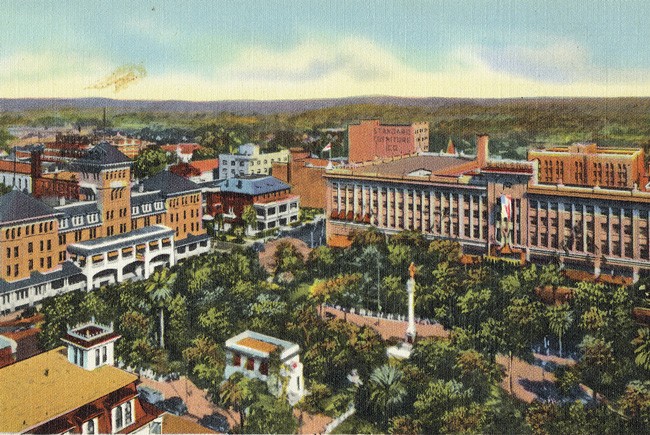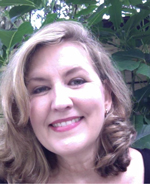
By Julie Delegal
I live in paradise. A broad, blue river runs through my city, crossed by seven bridges – three or four of them works of art in themselves. The skyline at night, sparkling in the mirror-blackness of the St. Johns, never fails to take my breath away. I love Jacksonville as I would a member of my family. I grew up with her.
But much like a family member, she often drives me insane. Occasionally, she even breaks my heart. Mostly, I just get impatient with her.
Impatience and anger welled on the day that our clerk of the courts, Ronnie Fussell, announced that if his office would have to marry same-sex couples in the courthouse wedding chapel, it would cease to marry anyone at all – gay or straight. It was a momentary punch in the gut to the progressive community in Jacksonville.
The sting of that assault didn’t last long, though, as we were too busy celebrating U.S. District Court Judge Robert Hinkle’s ruling, the one that would lift the stay and clarify what Attorney General Pam Bondi knew but didn’t want to say in so many words: That gays and lesbians have the same constitutional rights as heterosexuals regarding marriage; that when it comes to other people’s civil rights, we don’t get a vote.
The order that finally said it out loud was the result of a lawsuit brought by our own civil rights legend, attorney Bill Sheppard. Afterward, the community did what Jacksonville has only rarely done in the face of bigotry: they rallied, organized and stood up for themselves and each other.

Priests and other officials gathered to conduct dozens of weddings on Saturday in Hemming Park, a few blocks down from our courthouse, and right in front of City Hall. Hundreds poured into the newly revitalized park to witness the mass nuptials. The event drew journalists from as far away as Switzerland.
Judge Lance Day also got into the act, officiating a marriage in his courtroom earlier last week. Word has it that the Jacksonville Bar is looking to do more for those who want to get married in the courthouse, many of whom cannot afford all the bells and whistles of an elaborate wedding. Don’t close down that wedding chapel yet, Mr. Fussell.
All of this is fitting for a city that once filled the very same public square, Hemming Park, with racial hatred and violence 55 years ago. August 21, 1960, is known as Axe Handle Saturday, when white bigots savaged black sit-in participants and other civil rights demonstrators. Just as it was in 1960, religion was used again recently, to justify denying others’ constitutionally guaranteed rights. Last Saturday, journalists from far away were in Jacksonville’s Hemming Park, just as they were in 1960.
But January 10, 2015 was a celebration of love, not hate. It was a day for joining together, not ripping asunder. This time, instead of ignoring the history happening in our park, our town paper, the Times Union, covered Civil Rights Saturday in full, front-page color.
![]() Hemming Park has now been tailored to fit the covenant of mutual respect and mutual progress among the people of Jacksonville. It is fitting that we memorialize Civil Rights Saturday, while never forgetting Axe Handle Saturday.
Hemming Park has now been tailored to fit the covenant of mutual respect and mutual progress among the people of Jacksonville. It is fitting that we memorialize Civil Rights Saturday, while never forgetting Axe Handle Saturday.
While not all traditional civil rights activists support gay marriage, and while not all LGBTQ people care passionately about racial harmony, constitutional rights are, at bottom, human rights. Working for justice and peace requires constant gardening. And sometimes, like last Saturday, in beautiful downtown Jacksonville, history blossoms.
![]()
Julie Delegal, a University of Florida alumna, is a contributor for Folio Weekly, Jacksonville’s alternative weekly, and writes for the family business, Delegal Law Offices. She lives in Jacksonville.





























curtis says
I can’t seem to find marriage listed anywhere in my copy of the constitution.
can you tell me where it is listed as a constitutional right.
Drew says
Life Liberty and the Pursuit of Happiness. Sounds pretty cut and dried to me.
Gregg says
Considering that the Supreme Court has confirmed that marriage is a civil right on numerous occasions it is covered under the 14th Amendment of the Bill of Rights.
Anita says
Frankly, I find the headline for this article very misleading. While I’m happy to see the LGBT community gain acceptance in Florida, you can’t seriously compare the vicious attacks delivered to black Americans on Axe Handle Saturday with some pettifogging little clerk’s refusal to wed a same sex couple. And while gay people who came out were frequently ostracized, beaten and in worst cases murdered, they were far less likely to be subjected to draconian jim-crow laws, tortured by hooded thugs or found hanging from trees than were black Americans. I’ll bet that in ten or twenty years, being gay, lesbian or transgendered won’t be an issue professionally, even here in the Bible belt, but being a black American in positions of meaningful authority will still be problematic for white America.
Nicole H says
While the discrimination and violence against LGBT people may not be the same as oppression against Black people there are certainly parallels. Often LGBT people remain “in the closet” out of fear, which ultimately leads to a self destructive lifestyle in most cases. They often cannot connect to a community out of fear of discovery so the feeling of isolation can be strangulating. While Blacks have a history of oppression, the do have a sense of community that embraces them. They have Churches that support them. Historically, religion has told LGBT people from their earliest childhood that they were an abomination and unlovable. Blacks were never denied marriage or had their children taken away because of who they were. Inheritance rights, hospital visitation rights, end of life decisions were never denied as far as I know to Black spouses but they certainly were to LGBT couples. Much of those legal loopholes are why Marriage Equality is so important.
AIDS was a huge impetus for LGBT rights. So many people were “outed” because of their disease. The fear and discrimination that affected the lives of thousands of LGBT people created a palpable anger and people began to say “No More!”. If there is anything positive about AIDs it is the fact that AIDs forced LGBT people out of the closet and into the streets because “Silence Equals Death”. With the advent of the Internet, social change moved at lightening speed. Freedom of expression and thought were available to the masses and rational dialogue took place to counter the homophobic institutions that for too long had shaped the culture.
The point is that bigotry against Blacks is shameful. The bigotry against LGBT people is just as shameful.
The intersection of the two communities is in the shared hatred and bigotry both communities endured and continue to endure. I’m sure every individual’s experience is unique and that is why it is meaningless to try to compare which is worse or better.
confidential says
Whether LGTB, Blacks, Latinos and other minorities can we all get along together and Live and Let Live for God’s Sake?
Do I get the impression that since 2008 our civil rights have been pushed back and bigotry has flared, just because we elected a Black Commander in Chief? What a pathetic shame while the world is sure watching!